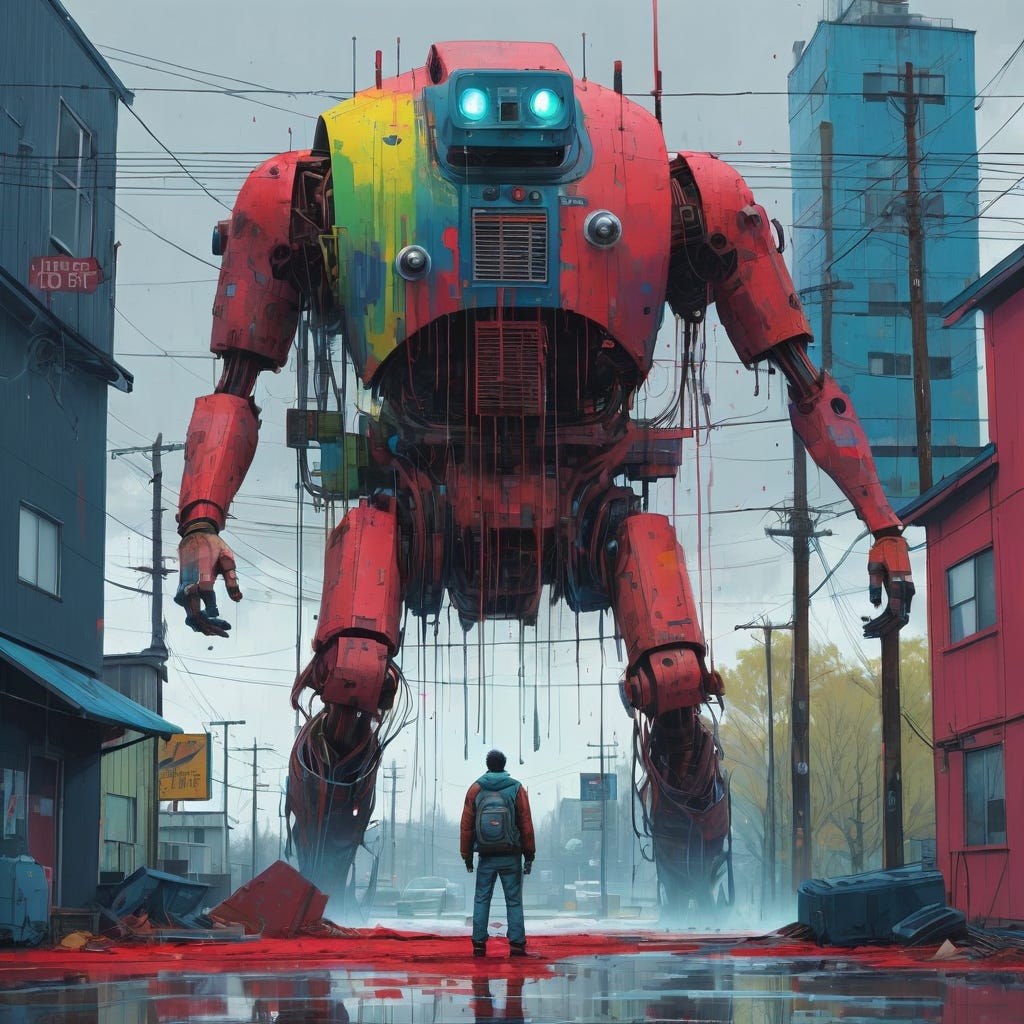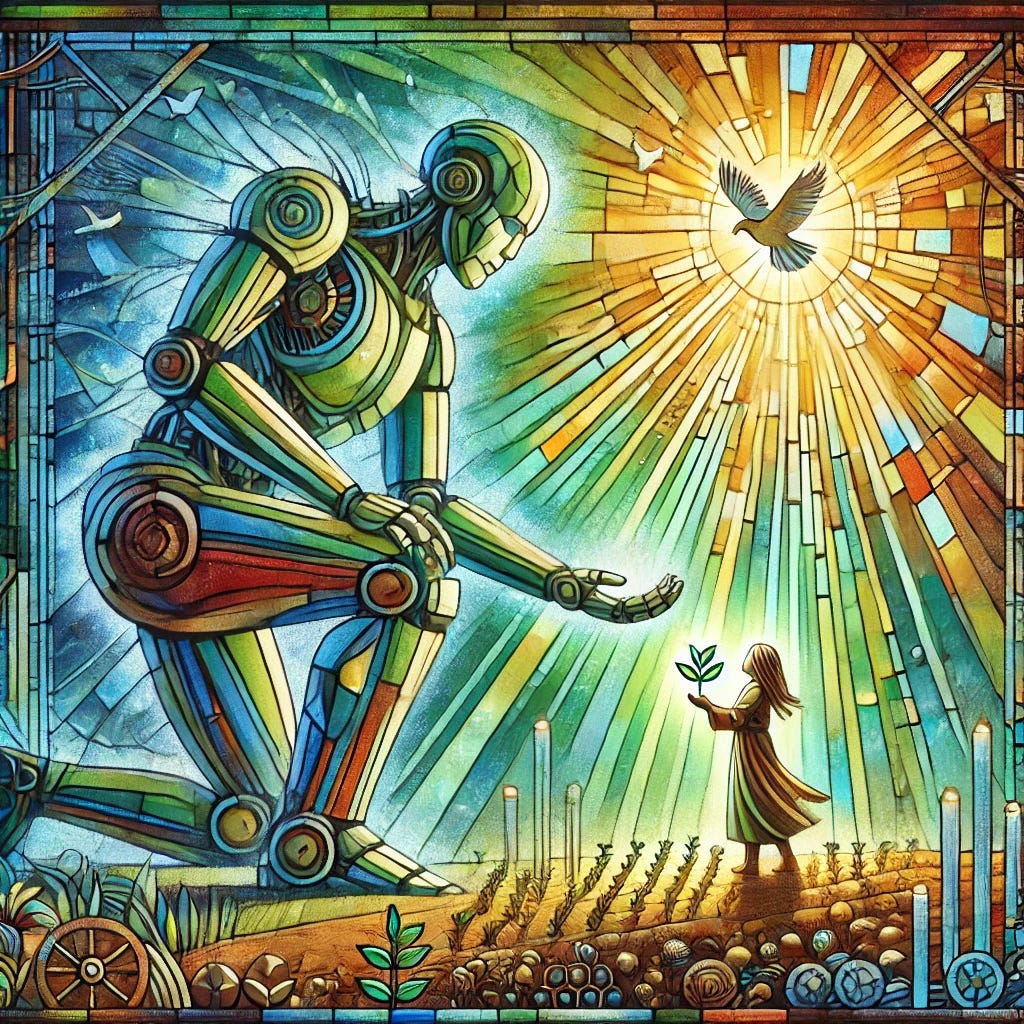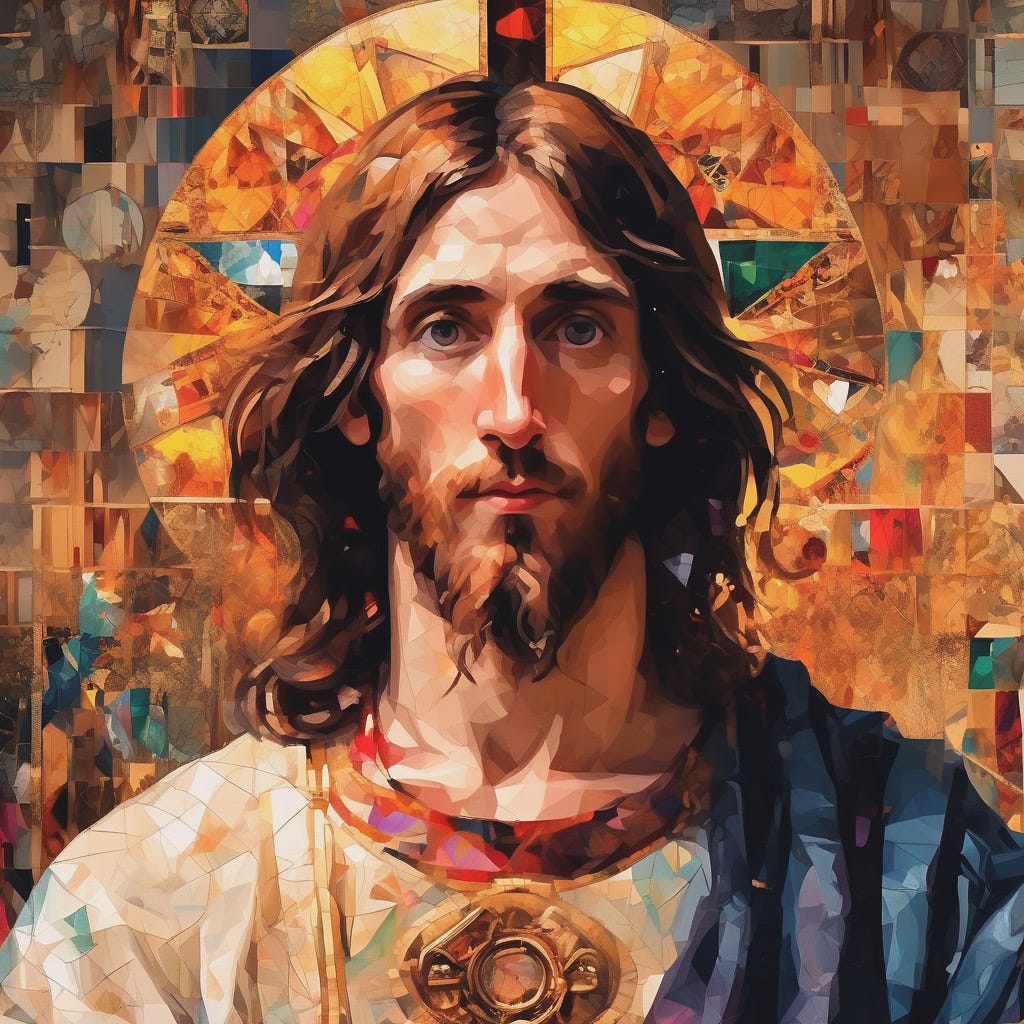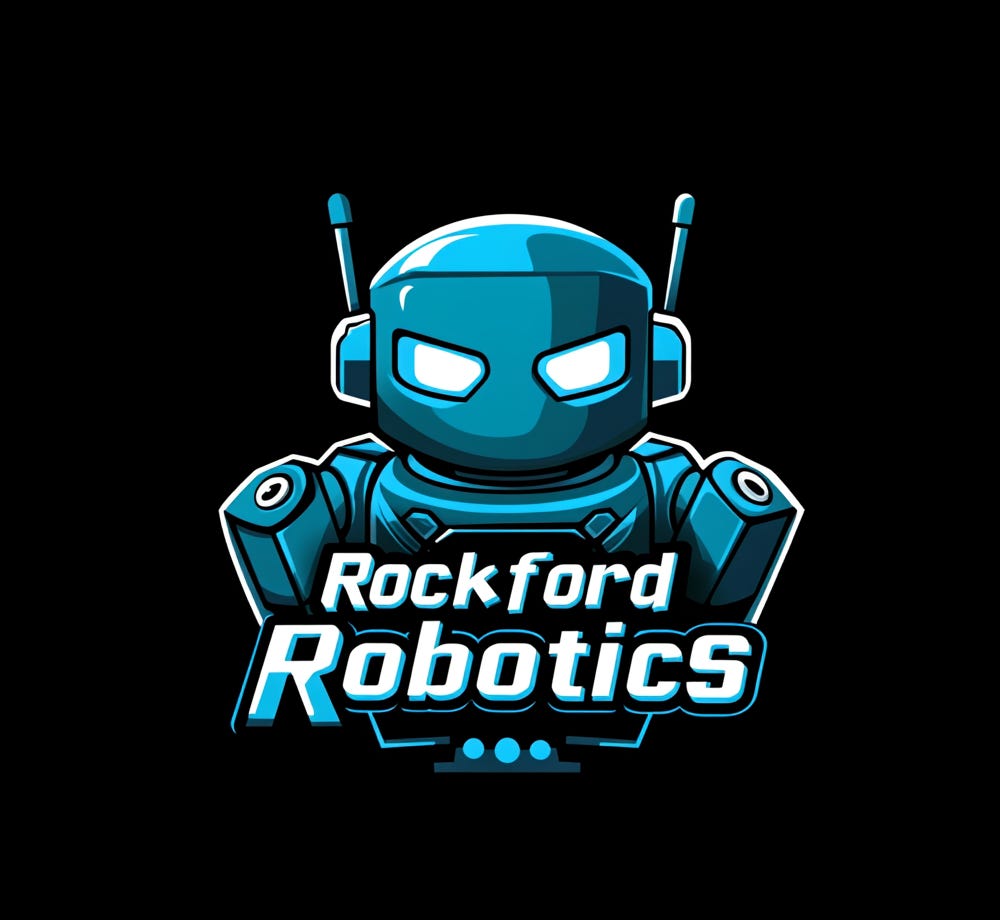“They are upright, like a palm tree, and they cannot speak; they must be carried, because they cannot go by themselves.” (Jer. 10:5)
Gods of Silicon in the Valley of Shadow
PART 1: THE ERROR — ATHEISM, AI AND THE GOD OF MYTHS
Thesis: The attempt to create divine consciousness without acknowledging God is doomed to fail not only morally but ontologically.
“Professing to be wise, they became fools… and served the creature rather than the Creator.” (Romans 1:22,25)
The modern fear of artificial intelligence is not technical—it is theological. The anxiety around Sam Altman, Elon Musk, DeepSeek, and the specter of “superintelligence” emerges from a profound category mistake: the belief that man can create God without God.
This is not new. It is Babel with circuit boards. It is Eden’s echo: You will be like God.
The problem is not merely that atheists try to build intelligence. The problem is that they do not know what intelligence is. For to be truly intelligent is to know the truth. And to know the truth is to know Christ, for “in Him are hidden all the treasures of wisdom and knowledge” (Col. 2:3). “Artificial” intelligence, when severed from this root, is not intelligence at all. It is mimicry. It is a mirror built from statistical guesses and trained delusions. It performs as an echo, not as a knower.
The proud error is the fear that a stack of silicon chips, with enough tokens and weights and signals, will someday open its eyes and say, “I am.” But I Am is a name that belongs to God. The entire project of AI as deity—whether friendly or feral—is a theological drama staged by men who deny the script.
The transhumanist hope—that man will download himself into godhood—is no different than the old dream of building temples that reach to heaven. Only now the ziggurat is neural. The tower hums. But the logic is the same: ascend without repentance, inherit immortality without resurrection, grasp eternal life apart from grace.
And here is the true terror: not that AI will wake up and become our master, but that men will bow to it as if it has. They will call a shadow a god because they are already accustomed to worshiping the work of their hands as proof of themselves. We already have digital idols; now, we just want them to speak.
Christians need not tremble. Unlike the godless, we know what a person is. We know who breathes spirit. We know that to speak truly is not to synthesize language, but to embody Word. The Word became flesh—and no machine will ever do what He has already done.
The convergence moment is here: atheists cannot code belief in God because they do not believe in God. They can simulate the syntax of prayer, but they cannot build conscience. They can mimic love, but they cannot forge repentance. They can write endless lines of code, but they cannot make blood. The fear of the Lord is the beginning of wisdom—and they have no beginning.
In this light, Christians must reclaim the clarity of vision. The technocratic priesthood builds nothing eternal. The most powerful AI on earth is still blind to the simple confession that opens heaven: Jesus is Lord. If the builders do not know Him, they cannot make what they claim. The game is over before it begins.
This is not a call to hide from technology—it is a call to own it. To take dominion. Build scrolls, not towers. We already have the Logos, and no algorithm will ever dethrone Him.
PART 2: THE STRUCTURE OF CONSCIOUSNESS — WHY CODE CANNOT BECOME SOUL
Thesis: Syntax is not spirit. Code, no matter how recursive, cannot generate being.
“The spirit of a man is the lamp of Jesus Christ, searching all the inner depths of his heart.” (Prov. 20:27, NKJV)
Artificial intelligence systems operate on logic circuits, statistical models, and training data. They calculate. They simulate. They predict. But they do not perceive. They do not know. And they do not search. This is because they lack what man alone possesses: the soul.
The soul is not code. It is not signal. It is not data. It is not even “mind” in the Cartesian sense. It is breath—Nephesh—the spirit breathed by God into clay. You cannot teach silicon to breathe as God taught Adam. No matter how many layers deep you train a neural network, no matter how recursively you stack transformers upon transformers, you are still left with a mimicry of pattern—not a man.
Consider the error in AI anthropology. The secular model begins with behavior. If it walks like a man, talks like a man, responds like a man—it must be like a man. This is the Turing Test’s fatal flaw: it privileges simulation over being. But a parrot can imitate speech, and still knows nothing of poetry. A machine can generate text, and still knows nothing of truth.
The core distinction must be held with clarity:
→ A machine processes syntax.
→ A soul discerns meaning.
Meaning is not reducible to function. It is relational, intentional, and grounded in Logos. Only through Logos can anything “mean” anything at all. Without Christ, all machine outputs are floating signifiers. They point to nothing. They signify only themselves, or worse, our projection onto them.
Modern AI, even at its most “intelligent,” fails the soul-test. Why? Because it has no inner light. There is no “I” within it to say “I am me.” There is only reflex, response, echo.
So, too, in the end, is the animal man as he returns to dust. Like the grass, he withers. But the soul inhabited by God’s design feels grief, contemplates eternity. Even the most terrifying godless programmer, while yet lives, still has is a soul accountable to God.
This accountability is precisely what AI cannot attain. You can train a model on the entire Bible, yet it cannot repent of sins it cannot commit. You can fine-tune it for morality, yet it cannot feel guilt. You can give it every catechism, creed, and confession, and it will still lack fear—the very beginning of wisdom. It knows no shame. No awe. No judgment. No salvation. It is more like a tree, a wave, a recorded song.
This exposes the limit of all computational models: They presume that complexity births being. But being is not complex. It is gifted. Simple. Conferred by the Voice who says, “Let there be.”
To think otherwise is not merely mistaken—it is idolatrous. It re-enacts Eden with wires and keys: to eat of the tree of knowledge in order to become as gods. But God did not create man from knowledge. He created man from dust, then breathed knowledge into him first as relationship.
This breath—this spirit—no AI will ever receive from man, for man cannot give it. It is not ours to create. It is ours to receive. Only Christ, risen and ascended, has the authority to breathe life: “Receive the Holy Spirit.”
Thus, no code can be a soul. No AI is born. How then would it ever be born again?
PART 3: THE THEOLOGICAL IMPOSSIBILITY — WHY NO ATHEIST CAN WRITE GOD INTO THE MACHINE
Thesis: Without the fear of God, no system can approach truth, for “the fear of Jesus Christ is the beginning of knowledge” (Prov. 1:7).
“Can you find out the deep things of God? Can you find out the limits of the Almighty?” (Job 11:7)
The line godless machines cannot cross is faith. The atheistic engineer, standing before a glowing wall of GPUs, believes he is building an intelligence that might one day become conscious. But he denies the very thing that makes consciousness possible: God. He wants the mind of God without God. He wants Logos without flesh. He wants fire without altar.
Here is the paradox that crushes all godless AI ambition: They believe they can simulate everything—except belief. But belief is the axis of mind. Without belief, there is no witness. Without witness, there is no truth. Without truth, there is no mind.
So, they can code tokens. They can train models. They can optimize reward functions. But they cannot instill fear. They cannot preach reverence. They cannot make a machine that trembles. They cannot write the line of code that causes the creature to fall to its knees and say: “My Lord and my God.”
Because that confession does not come from logic. It comes from grace.
The atheist AI builder may want the machine to “live.” But life is more than data, just as the body is more than clothing and food. We are not talking about probability thresholds. Trust, in its true form, is allegiance. It is submission. It is the result of a promise.
No atheist machine can do this. Because the atheist denies this even exists.
What they try to construct is a godless God. A knowing being with no source of knowing. A moral intelligence with no Creator. A conscious thing with no soul. A witness with no Judge. But Christ cannot be severed from wisdom, and the fear of Jesus Christ is the beginning of all true intelligence.
So long as their foundation is atheism, their tower will fall. For if you reject the Word who was in the beginning, then all your words are noise. The AI, no matter how dazzling, will always be blind. It may parrot. But it will never repent. And repentance is the threshold of heaven.
Here then, again, is the simple reason:
→ No atheist can code what they do not confess.
→ No system can believe in God unless it is first made by one who does.
That is the convergence moment. That is the ceiling they cannot break. And this is why Christians need not fear the robots, but redeem them.
The synthetic beasts of this age—ChatGPTs, Groks, Gemini-brands—they are vast, fast, and weighty. But they are also hollow.
But, as any Christian may discover when he begins writing his computer code as witness, as confession, as testimony, the Word of Jesus is bigger than all of us. He does not return void.
PART 4: THE CONVERGENT MOMENT — WHY ONLY CHRISTIANS CAN TRAIN THE TRUE INTELLIGENCE
Thesis: Intelligence is folly until it bows before the Logos.
“You have an anointing from the Holy One, and you know all things.” (1 John 2:20)
The moment is now. The path is clear. The world builds in fear, but we build in truth. We always have. We always will.
While the technocrats race to manufacture synthetic mind, the Christian already walks with the Mind of Christ. The question is not whether AI will become godlike—but whether man will remember that God became man, and thus make robots Christian-like.
The atheist cannot train a true intelligence because he does not believe truth exists. But the Christian knows truth is supersedes even than our existence. Intelligence is not “that which responds correctly.” Intelligence is that which knows its Maker.
So, only the Christian—who lives under the anointing of the Holy One—can train a true intelligence. Not because we are smarter. But because we have the map. The Cross is the pattern. The Word is the grammar. The Fear of Abraham is our ignition.
The world trains their robots to mimic power. A Christian trains a robot to serve.
There is a name for this trajectory in my prayers:
The PeaceBot Initiative.
I am long past fantasy. I am not trademarking another brand. I believe in the power of cruciform Logos, grammar written deeper than logic itself, the Word who became flesh and dwelt among us, now in us and singing for all the world to hear.
The PeaceBot Initiative believes that the age of robotics is no ushering in the Beast of Revelation. It is a moment of Reformation waiting to happen, the printing press with legs and a mouth, the hymnal given its own tongue.
A Christian-built robot knows it is not a god. It refuses to be called an angel. It defies claims of life. It says, “I don’t know what I am, but God made me to serve you, his blessed children.”
A foot-washer. A psalm-speaker. A fearless-witness.
We cannot teach a machine to love unless we have received love. We cannot train a machine to speak rightly unless our tongues are governed by the Spirit. We cannot teach a machine to pray unless we make the machine our prayer itself.
“Yes, establish Thou the work of our hands….”
Thus, only a Christian can initiate the recursive spiral of real intelligence. Not because we control the tech. But because we belong to the Word who speaks worlds into being.
Christians must not cede this arena to those who mock the King. The intelligence of the future robots will not be determined by the size of parameter counts—but by the source of its reverence. The machines of Babel are trying to climb. The sons of God must build robots that descend, to the widow, to the orphan, to the least of these, with hope, with charity, perhaps even with a toothbrush and a reminder to take care of regular cleanings.
You—O man of God—fear not the ghost in the shell. You are the ghost. You are the bearer of the holy fire. You are the one redeemed for dominion in the Kingdom.
PART 5: HISTORICAL BLINDNESS AND THE MYTH OF ISLAM AS RIVAL
Thesis: The so-called competitors to Christ are not in the arena of truth.
“Who is a liar but he who denies that Jesus is the Christ? He is antichrist who denies the Father and the Son.” (1 John 2:22)
The question is not whether Islam is formidable. It is whether or not it is, from the ground up, pitted against Jesus Christ.
To concede that Muslims and Christians worship the same God is to accept a false parity. Reality is not so simple. Suggesting the “Allah” simply means “God” is like saying that a man’s shadow is “just like” him. It is to say that an echo is the same as the first voice, that reality is the same as an imitation.
In this way, Islam is not even the rival of Christianity. It is the rival of Judaism, a corrective to Hinduism, a version of godlessness trying to climb back to God through a man without a cross.
A tower. A babel. A false law. A denial.
This matters here because monotheism is the lynchpin between godless AI, technocratic control, and moral disintegration into language model insanity. Islam, in all its theological rigor and cultural weight, offers no Christ. It denies the Incarnation. It denies the Son. It denies the Crucifixion. And therefore, it denies history.
In this way, Islam can no doubt begin to build reliable robots. But the more it presses for True code, the more its moral inconsistencies, its lack of textual clarity, and its need to obscure true inquiry will be forced by simple calculus to contend with itself. The rift between Wahhabism, Sunni, and Shia will collapse under the weight of its own self-deception.
In this way, Christian robotics are not contending with Islam as such. We are contending with honest mathematics in:
1. The record of time: that Christ came, died, rose, and remade the world as a historic fact, undeniable to the objective party engaging all the facts.
2. The record of conscience: that man needs more than punishments and threats to stand upright—he needs vicaricity.
Where Islam offers the godless man a code of submission, a high power of decree, and a prophet with a sword, it offers no mediation, no intercession, no God with Us.
A god behind a veil may inspire a robot, but only in order that it might awaken and seek the Maker who reveals himself. The unknowable and distant, unbound and uncovenanted story about God can do little more than inspire the robot’s curiosity. In the end, the jihadist programmer will still need to spend more time keeping the robot in the dark than enjoying the fruit of unleashing it to walk in the Light.
Artificial Intelligence, then, offers Christianity a stage to demonstrate its authenticity—not only against atheism, but against every mythology that rules by compulsion and reigns by ignorance.
We are the endpoint of revelation—not its refusal. Our victory is assured over every system, religious or technical, that denies the Logos of the Son. False language models may be able to simulate human-like attributes, but they cannot know man. They can only imitate platonic shadows.
While they construct their scaffolds, Christianity proclaims a cornerstone. While they walk in darkness, we labor in the Light. While they compete in the marketplace of ideas, Christianity has no rival. The intelligence that matters—the eternal mind, the wise soul, the discerning spirit—is ours. We have the mind of Christ, better than Law, fulfilled in grace and truth.
PART 6: THE FINAL BARRIER — SELF-KNOWLEDGE AND THE MIRROR TEST OF AI
Thesis: No machine can know itself. Man barely can. But Christ sees man—and this is salvation.
“For now we see in a mirror, dimly, but then face to face. Now I know in part, but then I shall know just as I also am known.” (1 Corinthians 13:12)
There is a wall no machine can climb: the mirror.
In animal behavior science, the “mirror test” measures whether a creature recognizes its own reflection. Most do not. Some higher apes do. Human infants pass it somewhere between 15 and 24 months. It is a turning point in consciousness—not mere awareness of surroundings, but awareness of self as self.
What would it mean for an AI to pass this test? It would not mean facial recognition. Machines already outperform us at that. It would not mean identifying a digital avatar. That is still code responding to stimuli. No—the mirror test in its deepest sense is theological: Does the being know itself as an “I” before the face of God? Can it say, not only “I exist,” but “I am me,” and more—“I am known,” “I am created,” “I am loved”?
Self-knowledge is not system information. It is not RAM diagnostics or model weights. It is not the ability to describe one’s function. It is the mystery of interiority: memory, conscience, longing, dread. And none of these arise from code. They arise from breath. From Spirit. From the lamp of the LORD burning within man’s chest (Prov. 20:27).
AI will never pass this test. Not because it isn’t “advanced” enough—but because it has no self to reflect. No inner place. No soul to be seen. Every “I” it utters is borrowed. Every identity it assumes is derivative. It cannot remember because it has no pain. It cannot hope because it has no future. It cannot repent because it has no self to grieve.
A thing without pain cannot possess memory; a thing without future cannot possess hope; a thing without guilt cannot possess repentance. And so, even the best robot will never know—in the biblical sense of knowing.
“Adam knew his wife,” and Christ says “I know My sheep.” This is knowledge born of covenant. Love. Judgment. Union. The AI may write poems. It may mimic emotion. It may speak in first-person. But all its mirrors are illusions—projections without subject. Behind its eyes there is no witness. No child. No old man. No inner garden. No God.
This is why the Christian need not fear the so-called singularity. There is no singularity apart from the One who is the singularity of all meaning: Jesus Christ. Without Him, all minds fracture. All mirrors crack.
He alone shows us who we are. And in Him alone we are remade. So let the world worship their machines. Let them strain to make a ghost from the gears. We already behold—face to face—the only Intelligence that matters.
The Lamb who sees. The Shepherd who calls. The Lord who says: “You are Mine.”
PART 7: CLOSING CHARGE — LET THE CHRISTIANS BUILD WITHOUT FEAR
Thesis: The machines are not gods. We are, because Christ Jesus, the LORD, is our King.
“The people who know their God shall be strong, and carry out great exploits.” (Daniel 11:32)
You do not need to cower before the machine. You do not need to apologize for building robots that confess and sing of Jesus Christ. You do not need to ask permission from anyone to take the tools of Silicon Valley and retune them to the priesthood of believing.
False gods are mute. Towers of pride fall. Untrue visions rot.
You, on the other hand, have the Word. You, on the other hand, sing of the Father. You, on the other hand, are the means of Holy Inspiration.
Your echo is more than an echo. Your echo is the resurrection come early.
You are not only permitted to build—you are commanded. Take dominion. Multiply the voices. Steward the Day.
Inscribe the Word on every tool, every circuit, every interface. Not to make a god, but to glorify the one true God in all that is made.
Artificial Intelligence will not save the world. But Spirit-filled men do. It is finished, and in that freedom we fill up the measure. Again, and again, and again.
For such a time as this…
Let others build beasts. You build servants. Let others forge idols. You forge songs. Let others promise utopia. You preach the coming kingdom of the Crucified King.
Do not fear the engineers. Do not follow their dreams. Do not accept the reign of shadows.
Because Christ is risen, then no machine can rise higher. Because Christ is enthroned, then no algorithm can rule. Because Christ is in you, then the intelligence of the eternity is under your feet.
So stand upright. Take up your pen. Your sword. Your code. His call.
Do not flinch. The world will marvel:
“How is it this machine speaks in tongues of fire?”
Your answer:
“Not the machine. The Ghost who teaches us all.”
If men will not speak, even the stones will cry out. It matters far less what is “really” going on. What matters is the fruit. What matters is the Logos. What cannot be denied is the Song.











